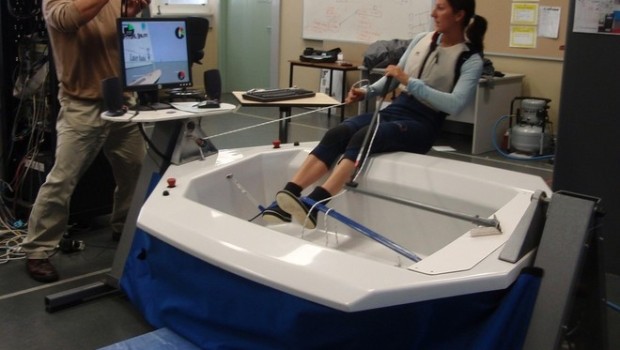Sailing simulator found to help spinal cord injuries
Published on November 20th, 2013
Researchers at the Kennedy Krieger Institute announced today the results of a pilot study demonstrating use of a virtual therapeutic sailing simulator as an important part of rehabilitation following a spinal cord injury (SCI).
Published in the American Journal of Physical Medicine & Rehabilitation, findings show that using a hands-on sailing simulator over a 12-week period helped participants safely learn sailing skills in a controlled environment, ultimately improving their quality of life by gaining the ability to participate in a recreational sport.
For many individuals living with paralysis, participation in recreational sports may seem impossible or even unimportant. This study is one of the first to scientifically quantify the positive impact of therapeutic sailing following a spinal cord injury, including a significant increase in overall self-confidence and sense of accomplishment among participants.
“Sports and recreation are a very important component of the rehabilitation process, not only for general physical well-being, but for improving overall quality of life for patients who have sustained spinal cord injuries,” says Dr. Albert Recio, study author and physician in the International Center for Spinal Cord Injury at Kennedy Krieger Institute.
“We are very pleased with the results of this unique training program and hope that this type of recreational tool can also help in the rehabilitation of patients with other disabilities.”
Study participants had chronic spinal cord injuries that occurred more than six months prior to beginning use of the Virtual Sailing VSail-Trainer, the first sailing simulator available for people with paralysis. The stationary, motorized sailboat cockpit features specialized software that enables patients to navigate the boat around a virtual course in the same way as an actual sailboat in the water.
Electronic sensors give the participant real-time feedback that matches their movements and allows them to control wind strength and water conditions. Participants had no previous sailing experience and worked with the sailing simulator for one hour per week for 12 weeks.
During each session, a therapist assessed several physical and neurological indicators and compared the results to measurements taken prior to beginning the training program. All participants completed a questionnaire at the beginning and end of the study designed to evaluate their quality of life and self-esteem.
Results showed that:
- All participants demonstrated rapid and substantial improvement in their sailing scores.
- All patients showed a significant positive increase in overall quality of life, including increased self-confidence and sense of accomplishment.
- Following completion of the training program, all subjects were able to successfully sail and perform specific maneuvers on the water at a sailing center in Baltimore, Md.
The results of this study provide preliminary evidence that the use of the Virtual Sailing’s VSail-Training technology in a safe, controlled environment enables individuals with SCI to learn the skills required to sail on the water and can result in quality of life improvements. Of note, the subjects were able to participate in a sports activity with their respective family members and experienced a sense of optimism about the future.
This pilot study involved only people with SCI; however, in principle this approach could be used with people with a wide range of injuries including loss of limbs and brain injury. Additional research will be required to develop the relevant protocols.





 We’ll keep your information safe.
We’ll keep your information safe.